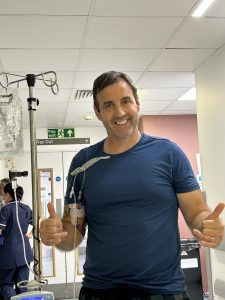
Adam’s Miles for Leukaemia
Patient Matthew talks openly about what is keeping him motivated during "the hardest time of his life".
Chronic Myeloid Leukaemia (CML) is a form of leukaemia where you have an increase in your white blood cells.
In CML, your bone marrow (the spongey part inside your bones) is producing too many myeloid cells, which are underdeveloped white blood cells that don’t work properly.
CML often develops slowly over several years, and is most common in people aged between 60 – 65.
Roughly, CML makes up 15 out of 100 leukaemia cases.
The majority of CML patients are asymptomatic, meaning little to no symptoms, and CML is only picked up through a blood test from their GP.
For some, where they have a much higher count of white blood cells, some patients experience:
– pain from an enlarged spleen
– Anemia
– Tiredness
– Bone pains
Treatment depends on if you’re asymptomatic or have a very high white blood cell count.
If you have a very high blood count, you could be put on a special machine that helps to skim off some of the extra white blood cells.
You could also be given medication to control and bring the white blood cell count down.

Patient Matthew talks openly about what is keeping him motivated during "the hardest time of his life".

Patient Matthew talks openly about what is keeping him motivated during "the hardest time of his life".

On Wednesday evening, the ATICUS Network in partnership with Cure Leukaemia was officially launched at the PwC offices in Manchester, in an event attended by businesses, clinicians along with a number of patients and their families.

Cure Leukaemia Chief Executive, James McLaughlin, completed an extraordinary 224 miles across 16 locations throughout Blood Cancer Awareness Month in September.